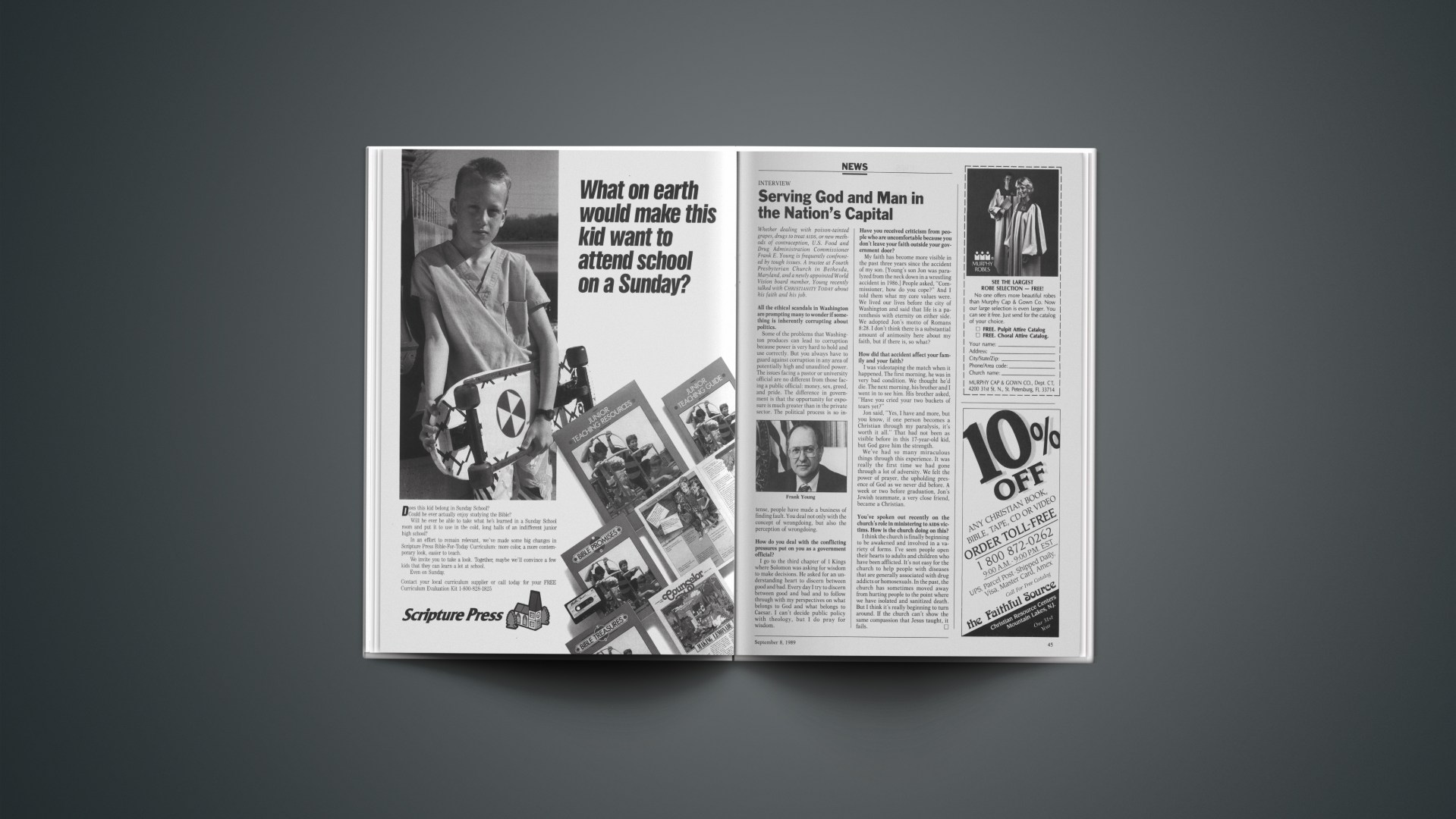Whether dealing with poison-tainted grapes, drugs to treat AIDS, or new methods of contraception, U.S. Food and Drug Administration Commissioner Frank E. Young is frequently confronted by tough issues. A trustee at Fourth Presbyterian Church in Bethesda, Maryland, and a newly appointed World Vision board member, Young recently talked with CHRISTIANITY TODAY about his faith and his job.
All the ethical scandals in Washington are prompting many to wonder if something is inherently corrupting about politics.
Some of the problems that Washington produces can lead to corruption because power is very hard to hold and use correctly. But you always have to guard against corruption in any area of potentially high and unaudited power. The issues facing a pastor or university official are no different from those facing a public official: money, sex, greed, and pride. The difference in government is that the opportunity for exposure is much greater than in the private sector. The political process is so intense, people have made a business of finding fault. You deal not only with the concept of wrongdoing, but also the perception of wrongdoing.
How do you deal with the conflicting pressures put on you as a government official?
I go to the third chapter of 1 Kings where Solomon was asking for wisdom to make decisions. He asked for an understanding heart to discern between good and bad. Every day I try to discern between good and bad and to follow through with my perspectives on what belongs to God and what belongs to Caesar. I can’t decide public policy with theology, but I do pray for wisdom.
Have you received criticism from people who are uncomfortable because you don’t leave your faith outside your government door?
My faith has become more visible in the past three years since the accident of my son. [Young’s son Jon was paralyzed from the neck down in a wrestling accident in 1986.] People asked, “Commissioner, how do you cope?” And I told them what my core values were. We lived our lives before the city of Washington and said that life is a parenthesis with eternity on either side. We adopted Jon’s motto of Romans 8:28. I don’t think there is a substantial amount of animosity here about my faith, but if there is, so what?
How did that accident affect your family and your faith?
I was videotaping the match when it happened. The first morning, he was in very bad condition. We thought he’d die. The next morning, his brother and I went in to see him. His brother asked, “Have you cried your two buckets of tears yet?”
Jon said, “Yes, I have and more, but you know, if one person becomes a Christian through my paralysis, it’s worth it all.” That had not been as visible before in this 17-year-old kid, but God gave him the strength.
We’ve had so many miraculous things through this experience. It was really the first time we had gone through a lot of adversity. We felt the power of prayer, the upholding presence of God as we never did before. A week or two before graduation, Jon’s Jewish teammate, a very close friend, became a Christian.
You’ve spoken out recently on the church’s role in ministering to AIDS victims. How is the church doing on this?
I think the church is finally beginning to be awakened and involved in a variety of forms. I’ve seen people open their hearts to adults and children who have been afflicted. It’s not easy for the church to help people with diseases that are generally associated with drug addicts or homosexuals. In the past, the church has sometimes moved away from hurting people to the point where we have isolated and sanitized death. But I think it’s really beginning to turn around. If the church can’t show the same compassion that Jesus taught, it fails.









